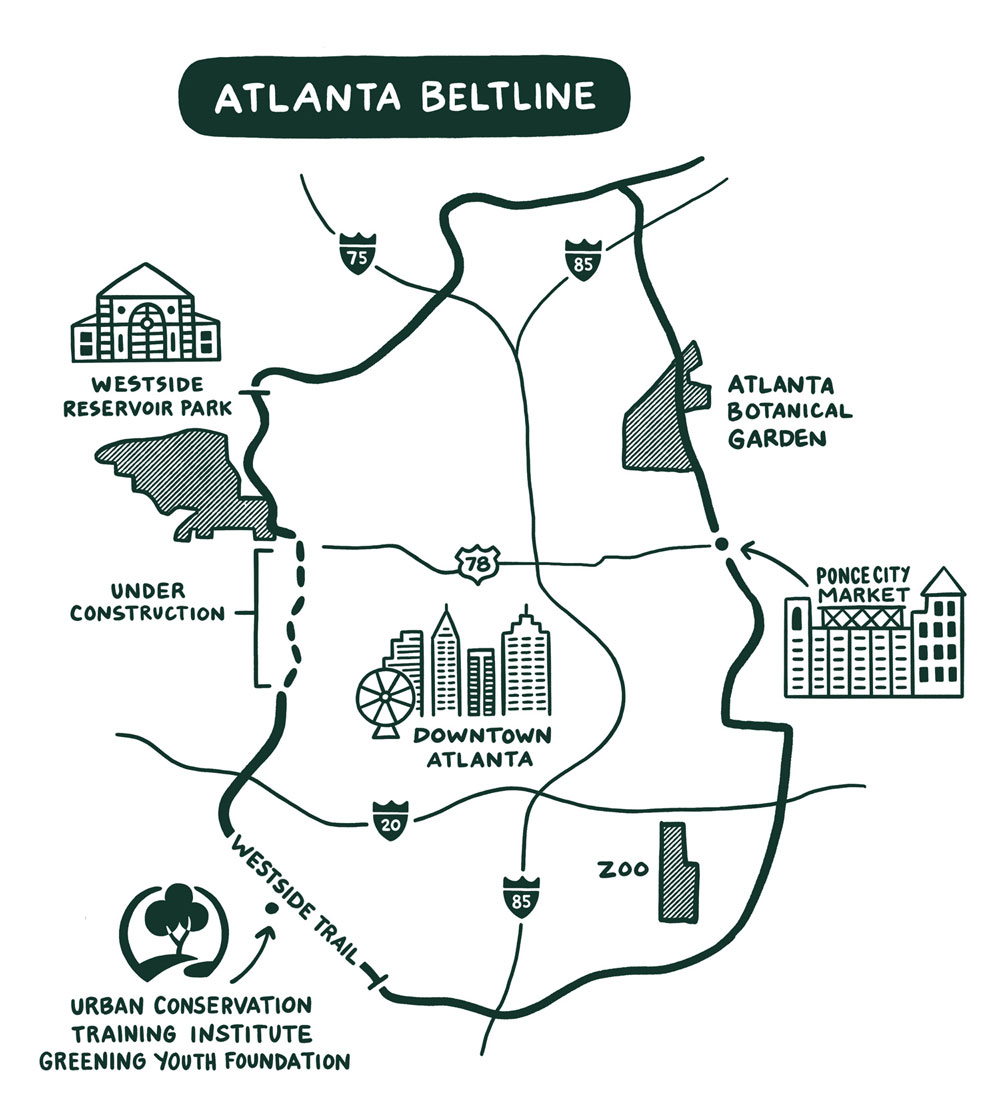Greening Youth Foundation and the Atlanta BeltLine
Everyone deserves to have access to green spaces near where they live. That’s why we’re working with community-led organizations like Greening Youth Foundation and Atlanta BeltLine, which are building and preserving close-to-home green spaces for generations to come.
Meet the Leaders

Illustration by Emily Irelan
Atlanta’s West End is one of the oldest neighborhoods in the metropolitan area: Founded in the 1830s, it’s long been a historical and cultural hub for the city’s Black residents. Within about a mile from here you’ll find the Atlanta University Center Consortium—the country’s oldest and largest conference of historically Black colleges and universities—and Hammonds House Museum, which celebrates diverse artists from across the African diaspora with a permanent collection of more than 450 fine art pieces. It’s also home to Westside Park, Atlanta’s largest green space at 280 acres, featuring wooded multiuse paths, a playground and a 350-feet-deep central reservoir.
Now, like many historically Black urban centers, Westside Atlanta is rapidly gentrifying. Rising housing costs and cultural shifts are forcing longtime residents to move, often to areas that lack access to green space like Westside Park. Pivotal work needs to be done not only to create and protect opportunities for Atlanta residents to enjoy the benefits of the outdoors, but also to develop the next generation of land stewards and advocates to continue prioritizing green spaces in the metro area.
For over 17 years, Greening Youth Foundation (GYF) has been an integral part of Atlanta's Westside community and instrumental in bringing numerous neighborhood young adults into the green job sector. The organization’s Environmental Education program teaches youth ages 6 to 11 about the climate crisis, carbon footprint reduction and composting, while the GYF Urban You th Corps provides job training in fields like conservation and urban agriculture for teens and young adults who are preparing to enter the workforce. GYF also connects young environmentalists to green jobs by partnering with land management agencies, the outdoor recreation industry and more with its Bridge Project, empowering the next wave of advocacy and action for the outdoors. Greening Youth Foundation is a current grantee of the REI Cooperative Action Fund, a community-driven nonprofit that supports organizations creating a more equitable outdoors.
The Greening Youth Foundation operates its Urban Conservation Training Institute just a 15-minute walk from mile marker 0 at the West End Trail on an ambitious urban redevelopment project: the Atlanta BeltLine. The BeltLine is an in-progress trail network seeking to connect 45 neighborhoods with 33 miles of multiuse paths along a former railway corridor encircling Atlanta’s core. The trail system aims to reconnect parts of the city that have been disenfranchised by infrastructure and real-estate developments, which have marginalized many of the communities with the longest legacies. Along with the trail system, the BeltLine project will create green jobs, offer transportation alternatives, support affordable housing, empower a new generation of conservationists, and become a cultural and artistic hub.
The 2.4-mile West End Trail was the first completed BeltLine segment in 2008, kicking off the project in the historic neighborhood that GYF also calls home. Currently, Greening Youth Foundation is working to plant more than 300 trees along the BeltLine in partnership with TREES Atlanta.
5 Ways You Can Get Outside in 5
Outside in 5
At REI Co-op, we believe time outside is a necessity. So we're supporting local organizations and national legislation to help get 100 million people Outside in 5 minutes or less.
Studies show that spending time outdoors is beneficial to our mental, physical and social well-being. But the national nonprofit Trust for Public Land has found that for nearly one-third of us, it isn’t as easy as simply stepping outside. Physical, economic, systemic and cultural barriers prevent many people from accessing green space to play, rest, explore, connect and recharge—this disparity is called “the nature gap.”
REI Co-op encourages all members to join us in telling Congress to help close the nature gap by supporting the following legislation:
- • The TREES (Trees for Residential Energy and Economic Savings) Act will create a grant program supporting tree planting projects in the communities who need them most.
- • Green Schoolyards legislation would help schools and districts to transform their schoolyards into dynamic outdoor learning environments through projects like improved shade coverage over school buildings; building food and pollinator gardens on school grounds; and offering children opportunities to observe, study and enjoy natural spaces.
- • Full funding for the Active Transportation Infrastructure Investment Program to help communities and regions across the country build better trail networks that ensure people can get where they want to go safely by foot, bike or wheelchair.
- • The Outdoors for All Act would create a dedicated source of funding for the Outdoors Recreation Legacy Partnership (ORLP) program, which supports projects that expand outdoor recreational opportunities in urban, Tribal and low-income communities across the nation, including new trails, green spaces, playgrounds, cultural gathering spaces and more.
It takes less than 60 seconds to join the REI Cooperative Action Network.
In Partnership


